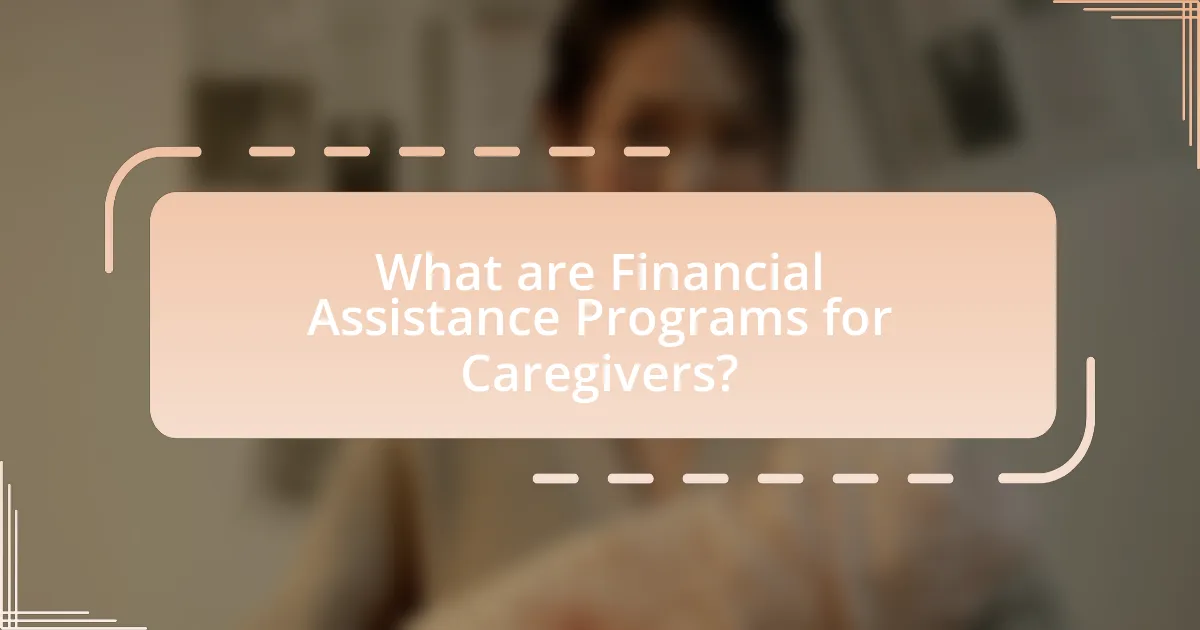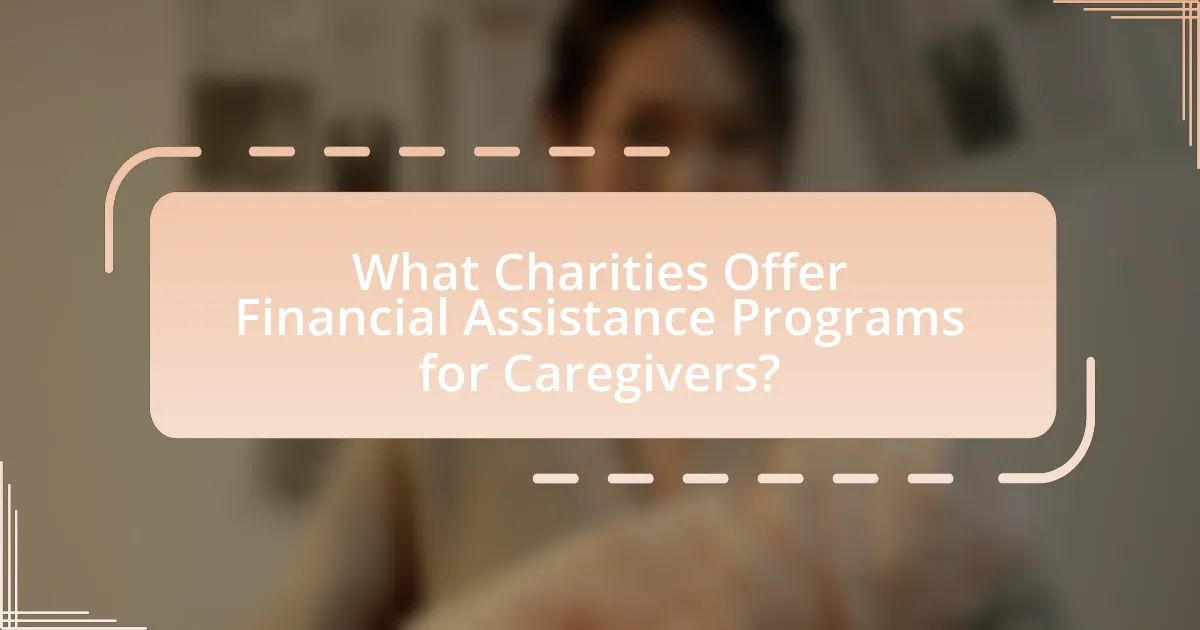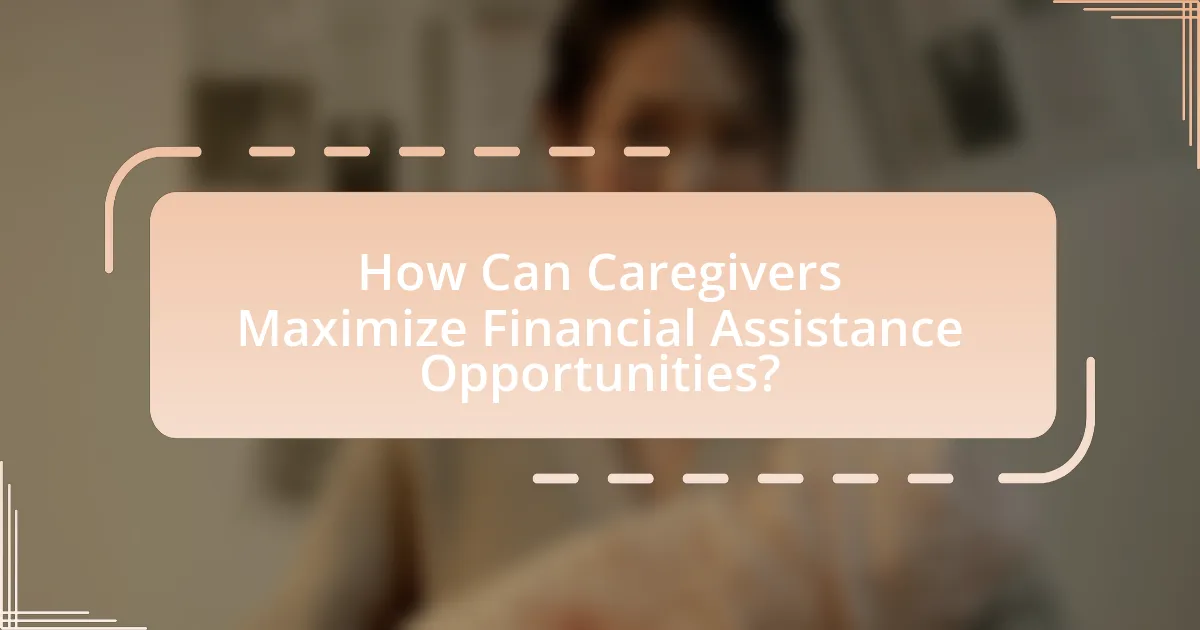Financial assistance programs for caregivers are designed to provide monetary support to individuals caring for family members or friends with chronic illnesses, disabilities, or age-related issues. These programs, such as the National Family Caregiver Support Program, offer grants, stipends, and reimbursements for caregiving expenses, helping to alleviate the financial burden associated with caregiving responsibilities. The article outlines the types of expenses covered by these programs, eligibility criteria for caregivers, and the importance of financial assistance in enhancing caregivers’ well-being. Additionally, it highlights various charities that offer financial aid, the application process, and strategies for maximizing assistance opportunities.

What are Financial Assistance Programs for Caregivers?
Financial assistance programs for caregivers are initiatives designed to provide financial support to individuals who care for family members or friends with chronic illnesses, disabilities, or age-related issues. These programs can include grants, stipends, or reimbursements for caregiving expenses, helping alleviate the financial burden associated with caregiving responsibilities. For example, the National Family Caregiver Support Program, funded by the Administration for Community Living, offers financial assistance to caregivers through state and local agencies, enabling them to access resources and services that enhance their caregiving experience.
How do these programs support caregivers financially?
Financial assistance programs for caregivers provide monetary support through direct payments, grants, and subsidies to alleviate the financial burden of caregiving. These programs often cover expenses such as medical supplies, transportation, and respite care, enabling caregivers to maintain their financial stability while fulfilling their caregiving responsibilities. For instance, the National Family Caregiver Support Program allocates federal funds to states, which then distribute financial aid to eligible caregivers, demonstrating a structured approach to supporting caregivers financially.
What types of expenses can these programs cover?
Financial assistance programs for caregivers can cover a variety of expenses, including medical costs, transportation fees, respite care services, and home modifications. These programs aim to alleviate the financial burden on caregivers by providing funds specifically designated for these essential services. For instance, the National Family Caregiver Support Program offers grants that can be used for respite care, which allows caregivers to take necessary breaks while ensuring their loved ones receive proper care.
Who qualifies for financial assistance programs for caregivers?
Individuals who provide care to family members or friends with chronic illnesses, disabilities, or age-related issues typically qualify for financial assistance programs for caregivers. These programs often target low-income caregivers, those who are unpaid, and caregivers who meet specific criteria set by organizations or government agencies. For example, the National Family Caregiver Support Program provides assistance to caregivers who are caring for individuals aged 60 and older or those with disabilities. Additionally, many state and local programs may have their own eligibility requirements based on income, the level of care provided, and the specific needs of the care recipient.
Why are financial assistance programs important for caregivers?
Financial assistance programs are important for caregivers because they provide essential financial support that alleviates the economic burden associated with caregiving responsibilities. Caregivers often face significant costs, including medical expenses, transportation, and lost wages due to reduced work hours or job changes. According to a report by the AARP and the National Alliance for Caregiving, caregivers in the U.S. spend an average of $7,000 annually out-of-pocket on caregiving-related expenses. This financial strain can lead to increased stress and decreased quality of life for both caregivers and those they care for. Therefore, financial assistance programs play a crucial role in ensuring that caregivers can continue to provide necessary support without facing severe financial hardship.
What challenges do caregivers face that necessitate financial support?
Caregivers face significant challenges that necessitate financial support, primarily due to the high costs associated with caregiving, including medical expenses, lost wages, and the need for respite care. According to a report by the AARP and the National Alliance for Caregiving, caregivers spend an average of $7,000 annually on out-of-pocket expenses related to caregiving, which can strain their financial resources. Additionally, many caregivers reduce their work hours or leave their jobs entirely to provide care, leading to a loss of income that further exacerbates their financial difficulties. These factors highlight the urgent need for financial assistance programs to support caregivers in managing their economic burdens.
How do these programs impact the well-being of caregivers?
Financial assistance programs significantly enhance the well-being of caregivers by alleviating financial stress and providing necessary resources. These programs often cover expenses related to caregiving, such as medical supplies, respite care, and transportation, which can reduce the economic burden on caregivers. Research indicates that caregivers who receive financial support report lower levels of stress and improved mental health outcomes, as evidenced by a study published in the Journal of Family Psychology, which found that financial assistance correlated with increased caregiver satisfaction and reduced anxiety levels. Thus, these programs play a crucial role in supporting caregivers’ overall health and quality of life.

What Charities Offer Financial Assistance Programs for Caregivers?
Several charities offer financial assistance programs for caregivers, including the National Family Caregiver Support Program, which provides grants to support caregivers, and the Caregiver Action Network, which offers resources and financial aid options. Additionally, the Alzheimer’s Association provides financial assistance specifically for caregivers of individuals with Alzheimer’s disease. These organizations are recognized for their commitment to supporting caregivers through various financial aid initiatives, ensuring they receive the necessary resources to manage their responsibilities effectively.
Which organizations are known for providing financial aid to caregivers?
The organizations known for providing financial aid to caregivers include the National Family Caregiver Support Program, the Caregiver Action Network, and the Alzheimer’s Association. The National Family Caregiver Support Program, funded by the Administration for Community Living, offers grants to states to provide services to family caregivers. The Caregiver Action Network provides resources and support, including financial assistance options for caregivers. The Alzheimer’s Association offers various programs that may include financial aid for caregivers of individuals with Alzheimer’s disease. These organizations are recognized for their commitment to supporting caregivers through financial assistance and resources.
What specific programs do these charities offer?
Charities focused on financial assistance for caregivers typically offer programs such as direct financial aid, respite care services, and educational resources. For instance, the Family Caregiver Alliance provides grants to help caregivers cover expenses related to caregiving, while the National Alliance for Caregiving offers workshops and training sessions to enhance caregiver skills. Additionally, organizations like the Alzheimer’s Association provide specific support programs tailored to caregivers of individuals with Alzheimer’s disease, including financial counseling and support groups. These programs are designed to alleviate the financial burden and improve the well-being of caregivers.
How can caregivers apply for assistance from these charities?
Caregivers can apply for assistance from charities by visiting the specific charity’s website or contacting them directly to obtain application forms and guidelines. Many charities require caregivers to provide documentation of their caregiving responsibilities, financial need, and sometimes personal references. For example, organizations like the Family Caregiver Alliance and the National Alliance for Caregiving offer structured application processes that include eligibility criteria and required documentation, ensuring that caregivers receive the support they need.
What are the eligibility criteria for these charity programs?
The eligibility criteria for charity programs that provide financial assistance to caregivers typically include being a primary caregiver for a family member or friend, demonstrating financial need, and residing in the service area of the charity. Many programs also require applicants to provide documentation of caregiving responsibilities, such as medical records or proof of relationship to the care recipient. Additionally, some charities may have age or income restrictions, ensuring that assistance is directed to those most in need.
Are there income limits for caregivers seeking assistance?
Yes, there are income limits for caregivers seeking assistance. Many financial assistance programs for caregivers, including those offered by charities, often have specific income thresholds that applicants must meet to qualify for support. For example, programs funded by the Department of Health and Human Services may set income limits based on the federal poverty level, which is updated annually. These limits ensure that assistance is directed toward those who are most in need, thereby making financial support more targeted and effective.
What documentation is typically required for application?
Typically, documentation required for application to financial assistance programs for caregivers includes proof of identity, proof of income, and documentation of caregiving responsibilities. Proof of identity may consist of a government-issued ID or Social Security card, while proof of income can include recent pay stubs, tax returns, or bank statements. Documentation of caregiving responsibilities often requires a letter from the individual receiving care or medical records that detail the caregiving situation. These documents are essential for verifying eligibility and assessing the financial need of applicants.

How Can Caregivers Maximize Financial Assistance Opportunities?
Caregivers can maximize financial assistance opportunities by actively researching and applying for various programs tailored to their needs. Many charities and organizations offer grants, subsidies, and financial aid specifically for caregivers, such as the Family Caregiver Support Program, which provides funding for respite care and support services. Additionally, caregivers should maintain thorough documentation of their caregiving expenses and needs, as this can strengthen their applications for assistance. Engaging with local community resources and support groups can also provide valuable information about available financial aid options, ensuring caregivers are aware of all potential resources.
What strategies can caregivers use to find the best financial assistance programs?
Caregivers can find the best financial assistance programs by researching local and national resources, utilizing online databases, and connecting with community organizations. Local agencies often provide information on state-specific programs, while national databases like Benefits.gov offer comprehensive listings of available assistance. Additionally, caregivers should reach out to non-profit organizations and charities that specialize in caregiver support, as they frequently have knowledge of financial aid options tailored to specific needs. For instance, the National Alliance for Caregiving provides resources and guidance on financial assistance, ensuring caregivers access relevant programs.
How can caregivers stay informed about new programs and resources?
Caregivers can stay informed about new programs and resources by subscribing to newsletters from relevant organizations, attending workshops, and joining online forums or support groups. These methods provide timely updates and insights into available financial assistance programs and resources tailored for caregivers. For instance, organizations like the National Family Caregivers Association and local community health services often share information through their newsletters and websites, ensuring caregivers receive the latest information on support options.
What tips can help caregivers successfully navigate the application process?
Caregivers can successfully navigate the application process by thoroughly understanding the requirements of each financial assistance program. This includes gathering necessary documentation, such as proof of income, medical records, and identification, which are often required for eligibility verification. Additionally, caregivers should carefully read the application instructions to avoid common mistakes that can lead to delays or denials. Researching available programs and seeking assistance from local organizations or support groups can provide valuable insights and guidance. According to the National Alliance for Caregiving, 61% of caregivers report feeling overwhelmed by the application process, highlighting the importance of preparation and support in achieving successful outcomes.
What common pitfalls should caregivers avoid when seeking assistance?
Caregivers should avoid the pitfall of not thoroughly researching available financial assistance programs before seeking help. Many caregivers overlook the variety of resources, such as local charities, government programs, and non-profit organizations that specifically cater to their needs. For instance, the National Alliance for Caregiving reports that only 20% of caregivers are aware of the financial assistance options available to them. Additionally, caregivers often fail to understand the eligibility criteria for these programs, which can lead to wasted time and effort. By being informed and prepared, caregivers can more effectively navigate the assistance landscape and secure the support they need.
How can caregivers ensure they meet all eligibility requirements?
Caregivers can ensure they meet all eligibility requirements by thoroughly reviewing the specific criteria outlined by each financial assistance program they are considering. Each program typically has distinct requirements related to income, caregiving responsibilities, and residency. For example, programs may require documentation such as proof of income, identification, and evidence of caregiving tasks performed. By gathering and organizing these documents in advance, caregivers can streamline the application process and increase their chances of approval. Additionally, caregivers should stay informed about any updates or changes to eligibility criteria by regularly checking the program’s official website or contacting program representatives directly.
What mistakes do caregivers often make during the application process?
Caregivers often make several mistakes during the application process for financial assistance programs. One common mistake is failing to thoroughly read the eligibility requirements, which can lead to submitting incomplete or ineligible applications. Additionally, caregivers frequently underestimate the importance of providing accurate and detailed documentation, such as income verification and medical records, which are critical for approval. A study by the National Alliance for Caregiving found that 30% of caregivers reported difficulties in understanding application forms, indicating a lack of clarity that can hinder successful submissions.
What resources are available for ongoing support beyond financial assistance?
Resources available for ongoing support beyond financial assistance include counseling services, support groups, educational workshops, and respite care programs. Counseling services provide emotional support and coping strategies for caregivers, while support groups offer a community for sharing experiences and advice. Educational workshops equip caregivers with skills and knowledge to manage their responsibilities effectively. Respite care programs give caregivers temporary relief by providing short-term care for their loved ones, allowing caregivers to recharge. These resources are essential for maintaining the well-being of caregivers and enhancing their ability to provide care.
How can caregivers access additional services and support networks?
Caregivers can access additional services and support networks through various organizations and online platforms dedicated to caregiver assistance. Many charities, such as the Family Caregiver Alliance and the National Alliance for Caregiving, provide resources, support groups, and information on local services. Additionally, caregivers can utilize online directories like Caregiver.com and AARP’s caregiver resources, which list community services, financial assistance programs, and peer support networks tailored to their needs. These resources are designed to help caregivers navigate their responsibilities while connecting them with essential support systems.
What role do community organizations play in supporting caregivers?
Community organizations play a crucial role in supporting caregivers by providing essential resources, services, and financial assistance. These organizations often offer programs that include respite care, training, and emotional support, which help alleviate the burdens faced by caregivers. For instance, the National Family Caregivers Association reports that community organizations can connect caregivers with local resources, including financial aid programs that help cover caregiving costs. Additionally, many community organizations advocate for caregiver rights and access to services, ensuring that caregivers receive the support they need to maintain their well-being while caring for others.